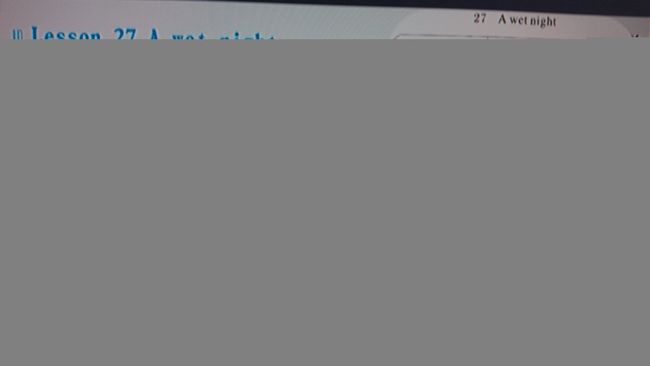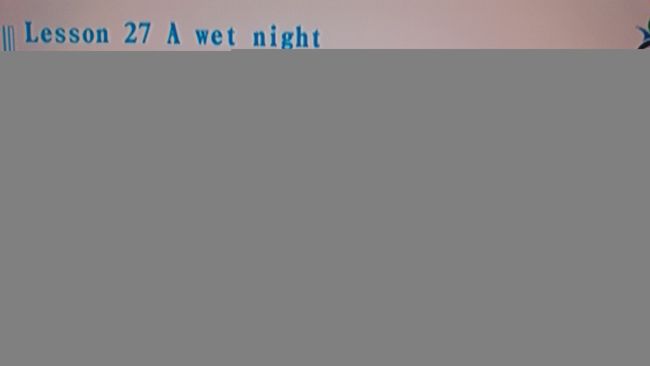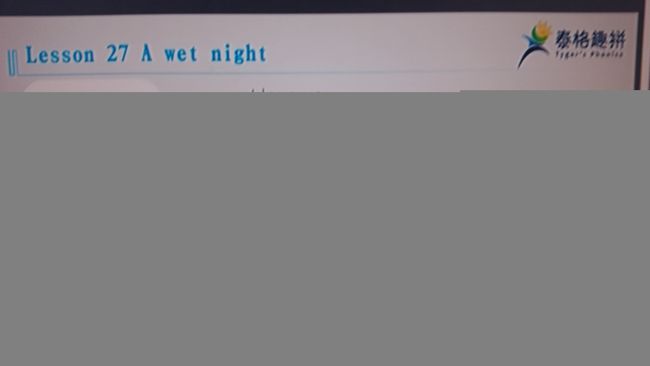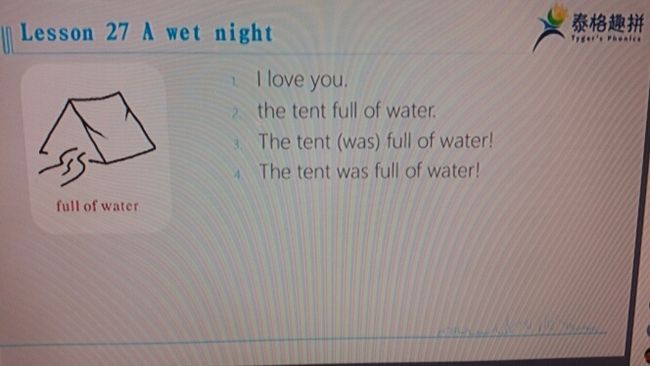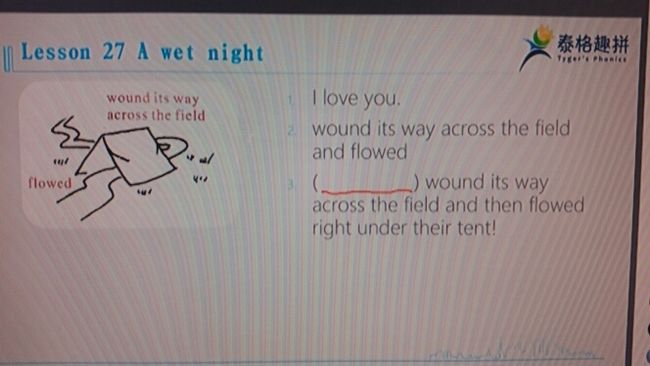老師送的一句話:人一思考,上帝就開始發笑(西方諺語)
科學用腦
一:記憶。
1:感官記憶(例:記電話號碼,大概維持3-5秒)
2:短期記憶(例考駕照,時間久了就忘了)
3:長期記憶(Tyger的所有的教學設計只對長期記憶負責)就是說,老師教的是方法,自創的,百度是查不到的,即使不是拿著新概念2,別的教科書也一樣能自學。
二:思考。
1:長期記憶建立在理解的基礎上。(還記得學拼讀,老師沒有講太多的理論,死記硬背,在拼讀的過程中,孩子會發現一些老師拼讀課沒講的詞,比如不發音,孩子裡解成(不見了)自己發現,會長期記在心目中。
2:用好大腦的關鍵靠思考,而非靠記憶。(還記得老師有要求背元音字母表,我家娃背a,e,I,o,u,r,y,w可熟練啦,可有一天放學,他氣乎乎跟我說:“媽咪tyger老師是個騙子”原來,他英語老師跟他們說r,y,w不是元音。Tyger老師也沒說過r,y,w是元音呀,可孩子背表時,自己歸類啦。那天我是很有耐心的認同他的想法,然後一如往常的玩拼讀軟件,每到有r,y,w的組合都提他一下,其他就沒多說啦。後來是他自己發現,原來r,y,w是元音組合。最後他知道他自己錯怪tyger老師啦。說了這段經歷,是深同感受老師這節課的說法,(腦子越用越活,知識越記越死)
二:科學自學寶典。(新概念2自學)
1:詞匯(先關後切,還原秘訣)
單詞自學表格。
2:表達:看圖說話,多維筆記。什麼是多維筆記,包括(降維,平維,升維)
3:配音:有的放矢,突出重難。(突出重點和難點)
4:精聽:固定時間,次量原理。(記憶跟次數有關)堅持,我是這樣想。
科學用腦用:詞匯,表達,配音,精聽。
學習Lesson 27A wet night
1:詞匯,先關後切,還原秘訣。
提問:括號ed發什麼音,3,cook(ed ),5,smell(ed), 8,tie(ed),11,hurri(ed),15,form(ed )16,flow(ed),這個只要用上ed詞尾口訣(輕發t,濁發d, ,,t, d詞尾發id)就沒問題啦!
2:表達:看圖說話,多維筆記。
看著這幅圖,心裡想著I love you.
1: Boys put up tent in the middle of a field afternoon.
2: Boys put up ( 1:) tent in the middle of a field ( 2: ) afternoon.(1:their),(2: in the)
3,原文:late in the afternoon,the boys put up their tent in the middle of a field.
和原文對照,多了個late,in the afternoon放到了前面。
筆記:late in the afternoon。(下午的晚些時候)筆記不是單詞,筆記是表達的範疇,表達是在口語,在寫作中用得上的內容。
1:They cooked a meal(. ) an open fire .
2: They cooked a meal (over )an open fire.
3: As soon as this was done , they cooked a meal over an open fire.
筆記:as soon as this was done, over an open fire.
on和over用中文表達都是(在.....上面)英語是比中文精確得多的語言,on的根本含義不是在....上面,它的含義叫(接觸) over是有空間的,沒有接觸的。
想著I love you
1:They hungry and food smelled good.
2: They (1) hungry and(2) food smelled good.(1:were)(2: the)
3:對照原文:They were all hungry and the food smelled good.多了個all.
4:筆記:They were all hungry.以後一看到all就長個心眼,看自己能不能掌握好。
例:謝謝你們所有人:Thank you all.
1:They told stories and sang songs (. )campfire.(beside)缺詞部分可以用(around)/(by).
2:They told stories and sang songs (by the)campfire.
3:After a wonderful meal, they told stories and sang songs by the campfire.
筆記:After a wonderful meal
Sang songs by the campfire.
Around 和by有什麼區別?Around就是圍著一個圈,by就是在圈的一邊。beside在什麼的旁邊。by=beside.回复888,就是說理解明白了。
多維筆記:
1:As soon as this was done, they cooked a meal over an open fire.
降維再升維
After
After this was done, they cooked a meal over an open fire.
After this was done, they cooked a meal over an open fire immediately.
As soon as this was done, they cooked a meal over an open fire.
筆記:as soon as=after doing sth,do sth immediately.表示動作之間非常的連貫,用中文意思表達就是(一....就) as soon as本質上就是after.
2: After a wonderful meal, they told stories and sang songs by the campfire.
升維:(升級成為自己不太熟悉的表達)
As soon as they had a wonderful meal, they told stories and sang songs by the campfire.
As soon as用在一做完一件事馬上做令外一件事。
After的表示是不慌不忙的做完一件事再做令外一件事。本質是相同的。
1:but later, it began to rain.
2: but (some time) later, it began to rain.
3: 原文:But some time later it began to rain.
4:筆記:but some time later
Some time (一段時間,一些時間, time 是表示時間,) some times (有時) times在這是复數,表示次數。
你一思考,上帝就在微笑用的就是as soon as.
1:Boys felt tired, they put out the fire and crept into the tent.
2: The boys felt tired (so) they put out the fire and crept into their tent.
3:原文The boys felt tired so they put out the fire and crept into their tent.
4:筆記:so
5: I love you so I marry you, not because you are rich.
1:Sleeping bags warm and comfortable , boys slept soundly.
2:(Their) sleeping bags (were) warm and comfortable,(so) they all slept soundly.
這篇課文中反复用了Their而沒用(a, the)是因為用 their更精準。
3:Their sleeping bags were warm and comfortable, so they all slept soundly.
4:筆記:so
1:night, two boys work up and began shouting.
2:(In the middle of the) night, two boys woke up and began shouting.括號可以換成(At midnight )
3:原文:In the middle of the night, two boys woke up and began shouting.
4:筆記:in the middle of the night.
多維筆記:
1:But some time later it (began to rain.)
2: In the middle of the night, two boys woke up and (began shouting.)括號中可以換成(began to shout)
began shouting和began to shout有區別
同維筆記:
各就各位預備.......跑!
A: start to run.(預備中,還沒跑出去)(to run還沒發生)
B: start running.(開始跑了)(已經開始了)
1:the tent full of water.
2: The tent (was) full of water!
3:原文:The tent was full of water!
1:Boys leapt out of sleeping bags and hurried outside.
2: They (all) leapt out of (their) sleeping bags and hurried outside.(their和the的用法,their更精準表達)
3:原文:They all leapt out of their bags and hurried outside.
4:筆記:They all leapt out of their sleeping bags.
1:It raining heavily and boys found a steam had formed.
2: It (was) raining heavily and (they) found that a stream had formed in the field.
3:原文:It was raining heavily and they found that a stream had formed in the field.
4:筆記:It was raining heavily
1: wound its way across the field and flowed.
2:(The streat) wound its way across the field and then flowed right under their tent.
3:原文:The streat wound its way across the field and then flowed right under their tent.
4:筆記:wound its way across the field.
多維筆記
The streat wound its way across the field and then flowed right under their tent.
降維:
什麼叫Wound?
The stream walks its way across the field .(walks走路)
The stream walks its curly way across the field.(curly彎彎曲曲的走)
The stream winds its way across the field.(winds有兩個意思這裡指的是彎曲,i發長音,還有個是指風wind,i發的是短音)
The stream (wound )its way across the field.括號中的wound是過去式。
筆記:Winds its way
例:The path winds its way to the top of Mountain .
多維:
The stream flowed under their tent.(flowed是流動,)
The stream flowed right under their tent (right是恰好的意思)
筆記:right
The stream wound its way across the field and then flowed right under their tent.
配音:有的放矢,突出重難。
小結:何謂知識?
知識不僅僅是信息,而且還是有價值觀基礎的、邏輯化、結構化了的信息。就像愛因斯坦有句名言,“所謂教育,就是當一個人把在學校所學全部忘光之後剩下的東西。
知識是人類智慧的結晶,是人腦深入思考後的結果。

